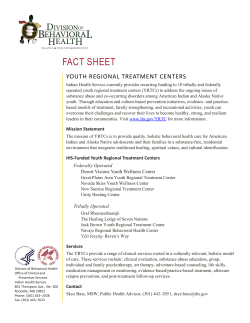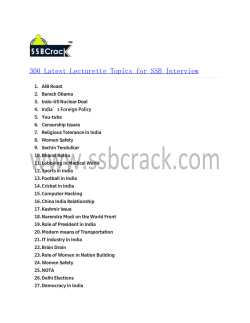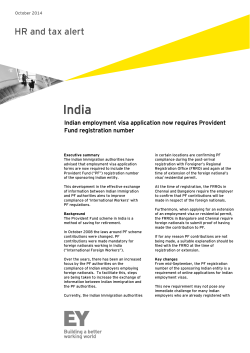
Why Treaties Matter: Sovereignty and Existence Terry L. Janis Indian Land Tenure Foundation
Why Treaties Matter: Sovereignty and Existence Terry L. Janis Indian Land Tenure Foundation Returning Indian Lands to Indian People www.iltf.org Our Mission Land within the original boundaries of every reservation and other areas of high significance where tribes retain aboriginal interest are in Indian ownership and management www.iltf.org Our Strategies Education • Indian land curriculum, strategic land planning, estate planning Economic Opportunity • Informational sessions for government leaders, landowner financial training Cultural Awareness • Sacred site protection, tribal land histories Legislative & Legal Reform • Native Land Law Initiative www.iltf.org Definitions of Sovereignty • The “supreme power, esp. over a body politic [and] freedom from external control . . . .” Webster’s Ninth New Collegiate Dictionary (Springfield MA: Merriam‐Webster, Inc, 1985) 1129. • “Sovereignty is supreme authority, which on the international plane means not legal authority over all other states but rather legal authority which is not in law dependent on any other earthly authority.” Oppenheim’s International Law Vol 1, Universal Law Publishing, 9th Edition, 1996, Pg 122 www.iltf.org Native Nations are Sovereign Peoples “The Indian Nations had always been considered as distinct, independent, political communities, ... . ... and the settled doctrine of the law of nations is, that a weaker power does not surrender its independence – its right to self‐government – by associating with a stronger, and taking its protection. A weak state, in order to provide for its safety, may place itself under the protection of one more powerful, without stripping itself of the right of government, and ceasing to be a state.” Worcester v. Georgia, 31 U.S. 515, 559‐60 (1832). www.iltf.org With the Inherent Right of Self‐government “Perhaps the most basic principle of all Indian law … is the principle that those powers which are lawfully vested in an Indian tribe are not, in general, delegated powers granted by express acts of Congress, but rather inherent powers of a limited sovereignty which has never been extinguished. ... From the earliest years of the Republic the Indian tribes have been recognized as “distinct, independent, political communities,” and, as such, qualified to exercise powers of self‐government, not by virtue of any delegation of powers from the Federal Government, but rather by reason of their original tribal sovereignty.” Handbook on Federal Indian Law, 1941 Cohen, at 122 (citation and footnote omitted) (emphasis in original). www.iltf.org Treaty Making with Indian Nations • All treaties made, or which shall be made … shall be the supreme Law of the Land, U.S. Const. art. VI, cl.2 . • Indian nations often granted land and other resources to the United States but retained all rights not specifically granted and other attributes of inherent sovereignty. Worcester v. Georgia, 31 U.S. 515, 554 (1832). www.iltf.org Minnesota Treaty History • From 1805 to 1867 there were 41 treaties with the U.S. government involving indigenous people/land within Minnesota Territory. MHC Why Treaties Matter website. • Treaties of 1795, 1825, 1826, 1837, 1847 and 1854 with Anishinabe reserved hunting, fishing and gathering rights to ceded lands. • Reserved Rights Doctrine www.iltf.org Minnesota v. Mille Lacs Band of Chippewa Indians • “In 1837, the United States entered into a Treaty with several Bands of Chippewa Indians. Under terms of this Treaty…the United States guaranteed to the Indians certain hunting, fishing and gathering rights on the ceded land….After an examination of the historical record, we conclude that the Chippewa retain the usufructuary rights guaranteed to them under the 1837 Treaty.” Minnesota et al. v. Mille Lacs Band of Chippewa Indians, 526 U.S. 172, 175 (1999). www.iltf.org Aboriginal and Fee Title •Doctrine of Discovery •Marshall Trilogy: Johnson v. McIntosh (1823), Cherokee Nation v. Georgia (1831), Worcester v. Georgia (1832) •Tee‐Hit‐Ton Indians v. United States, 1955 www.iltf.org Treaties and Plenary Power • Article VI, Clause 2, “All treaties…shall be the supreme law of the land.” • Cannons of Construction • Reserved Rights Doctrine • US v. Kagama (1886); Lone Wolf v. Hitchcock (1903) www.iltf.org Trust Title and Trust Relationship •General Allotment Act of 1887 •Indian Reorganization Act of 1934 •Trust Relationship under Cherokee Nation v. Georgia; US v. Mitchell (1980 and 1983); US v. Jicarilla Apache Nation (2011) www.iltf.org Authority to Govern • States are generally prohibited from taxing or regulating Indian lands without congressional approval. • If alienable then taxable and subject to state regulation. • House Concurrent Resolution 108 (1953). • Public Law 83‐280 (1953). www.iltf.org Why Treaties Matter: Sovereignty and Existence Terry L. Janis Office 651‐766‐8999; Cell 651‐788‐3454 tjanis@iltf.org www.iltf.org
© Copyright 2025





















